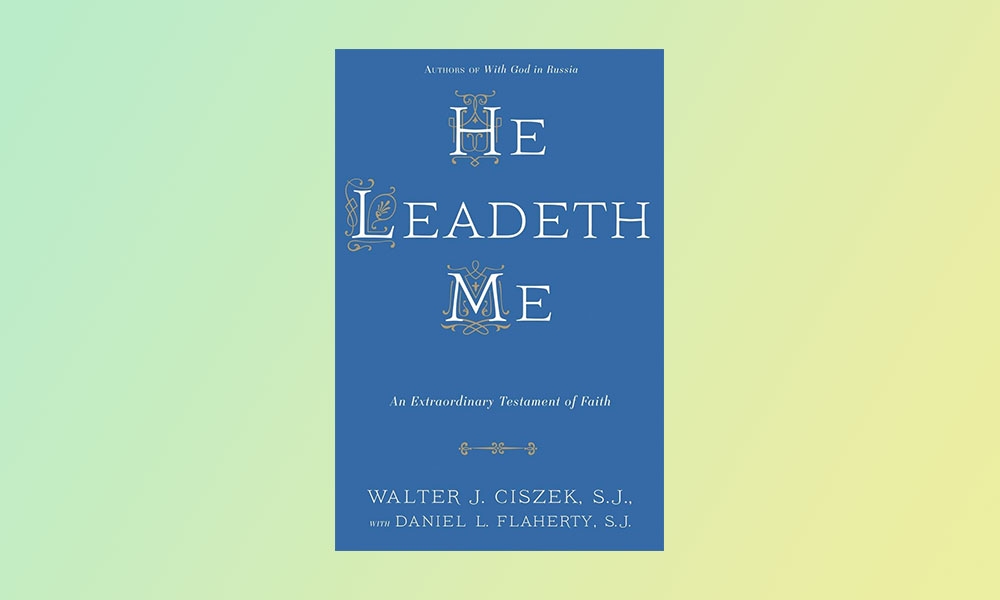
He Leadeth Me
By Father Walter Ciszek, S.J. and Father Daniel H. Flaherty, S.J.
Jesuit priest held captive for 23 years finds true freedom in God
By Father Walter Ciszek, S.J. and Father Daniel H. Flaherty, S.J.
Jesuit priest held captive for 23 years finds true freedom in God
Forty years after his death, Servant of God Father Walter Ciszek continues to inspire readers in his spiritual memoir He Leadeth Me. Written with the help of Father Daniel Flaherty, S.J., He Leadeth Me chronicles Father Ciszek’s 23 years as a prisoner of the Soviet Union during and after the Second World War. FAITH editors revisited this 20th century classic in honor of Father Ciszek’s ongoing cause for canonization, which opened in Rome in 2012.
Forty years after his death, Servant of God Father Walter Ciszek continues to inspire readers in his spiritual memoir He Leadeth Me. Written with the help of Father Daniel Flaherty, S.J., He Leadeth Me chronicles Father Ciszek’s 23 years as a prisoner of the Soviet Union during and after the Second World War. FAITH editors revisited this 20th century classic in honor of Father Ciszek’s ongoing cause for canonization, which opened in Rome in 2012.
A little background
The son of Polish immigrants, Walter Ciszek was born in Shenandoah, Penn., in 1904. As an adolescent, Walter earned a reputation for being tough; he insisted on doing everything “the hard way.” His natural inclination for self-sacrifice made him receptive to God’s call to the priesthood, and he entered the Jesuit novitiate in 1928.
From the moment he learned of Pope Pius XI’s appeal for missionaries to Russia, Walter, still a novice, was convinced that God was calling him abroad. In 1934, he left New York for Rome’s Pontifical Russian College to continue his seminary studies. After his ordination in 1937, Father Ciszek spent two years in Poland before entering Russia disguised as a laborer. For a year, he worked in the Ural Mountains as a logger and discreetly ministered to his fellow workers.
In 1941, the Soviet Union’s secret police arrested Father Ciszek under the false allegation of Vatican espionage and brought him to Moscow’s Lubyanka Prison. He spent the next five years in solitary confinement, where he routinely endured interrogation and torture. From there, he was sentenced to an additional 15 years of forced labor in a Gulag 300 kilometers north of the Arctic Circle.
Even after completing his sentence, Father Ciszek was not allowed to leave Siberia. In secret, he continued to celebrate the sacraments and provide spiritual guidance to a deeply grateful Russian peasantry. Finally, in 1963, the U.S. secured his release in exchange for two Soviet spies. Father Ciszek returned to New York, lecturing and offering spiritual direction until his death in 1984.
The test of faith
After his release, Father Ciszek’s response to the oft-asked question, “How did you survive?” was always, “faith.” His was no superficial faith, however. Reflecting on a particularly profound moment of conversion in solitary confinement, Father Ciszek writes, “I chose, consciously and willingly, to abandon myself to God’s will, to let go completely of every last reservation.”
It is to this place of total self-surrender that God repeatedly invited Father Ciszek during his many years of imprisonment. Learning to recognize Divine Providence in all things, to embrace each moment of life as coming from the hands of God, Father Ciszek found the key to enduring the most inhumane conditions. Never abandoning his priestly vocation, he even became a source of consolation for others.
True freedom
Father Ciszek’s reflections on abandonment to God’s will propose a radically counter-cultural notion of freedom to the modern reader. Modernity equates freedom with license – the ability to “do whatever I want” without restraint. During his imprisonment, Father Ciszek found freedom not in exterior liberty but in an interior movement of the soul. Freedom, he relates, is a complete submission to God made possible by an unshakeable faith in his Providence. Such an act is not blind surrender, but the surrender of a soul who knows God’s goodness and power and has chosen, with the help of his grace, to trust him. In making this act of abandonment, Father Ciszek discovered a profound peace of soul.
For the world
He Leadeth Me is the intimate account of Father Ciszek’s journey to the furthest limits of confidence in God. Yet what God accomplished in the soul of this self-described “hardheaded” Jesuit was not for Father Ciszek alone. Providence sustained him during his imprisonment; Providence secured his freedom; and Providence now continues to make the testament of his faith known. For the modern reader disillusioned by assertions that happiness is found in unchecked self-determination, He Leadeth Me is a roadmap to true freedom and lasting peace in God.
Allison Ramirez is a Catholic author, editor and teacher. She holds an M.A. in theology with an emphasis on Church History.

